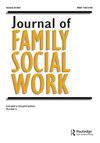Social work practice with war-affected children and families: the importance of family, culture, arts, and participatory approaches
IF 0.7
Q3 SOCIAL WORK
引用次数: 21
Abstract
ABSTRACT War and armed conflict not only gravely impact individual children, but the entire family system, with the impacts of war further compounded by the complexities of displacement, flight, migration, and resettlement to new contexts. These processes can cause destabilizing ruptures in the social fabric, networks, and services that support and protect children and families, ultimately hindering their potential protective capacities and potentially contributing to negative long-term intergenerational effects. The family plays a vital role in shaping children‘s mental health and well-being in conflict and post conflict settings, and thus the family needs to be accorded greater consideration in designing psychosocial support services for war-affected populations. With growing numbers of war-affected refugees resettling in Canada and the U.S., it is critical that psychosocial programs and interventions address their unique needs, as individuals, families, and communities. Moreover, there is a greater need for culturally responsive practice with war-affected refugee children and families that accounts for the diversity and heterogeneity of their needs and lived experiences. In this Special Issue entitled: “Children of War and their Families: Perspectives on Social Work Practice & Education”, we suggest that factors such as fostering a family approach, allotting careful attention to context and culture, alongside an emphasis on linking the arts and participation with social work practice, can be key social work contributions to research, education, and practice with this important and often overlooked population.受战争影响的儿童和家庭的社会工作实践:家庭、文化、艺术和参与方法的重要性
战争和武装冲突不仅严重影响着儿童个体,也影响着整个家庭体系,而流离失所、逃离、移民和重新安置等问题的复杂性又进一步加剧了战争的影响。这些过程可能导致支持和保护儿童和家庭的社会结构、网络和服务出现破坏稳定的断裂,最终阻碍其潜在的保护能力,并可能造成负面的长期代际影响。在冲突中和冲突后环境中,家庭在塑造儿童的心理健康和福祉方面发挥着至关重要的作用,因此,在为受战争影响的人口设计社会心理支助服务时,需要更多地考虑到家庭。随着越来越多的受战争影响的难民在加拿大和美国重新定居,社会心理项目和干预措施解决他们作为个人、家庭和社区的独特需求至关重要。此外,更需要对受战争影响的难民儿童和家庭采取符合文化的做法,因为他们的需要和生活经历各不相同。在这期题为“战争儿童及其家庭:社会工作实践与教育的视角”的特刊中,我们建议,诸如培养家庭方法,仔细关注背景和文化,以及强调将艺术和参与与社会工作实践联系起来等因素,可以成为社会工作对这一重要但经常被忽视的人群的研究,教育和实践的关键贡献。
本文章由计算机程序翻译,如有差异,请以英文原文为准。
求助全文
约1分钟内获得全文
求助全文
来源期刊

Journal of Family Social Work
SOCIAL WORK-
CiteScore
2.10
自引率
0.00%
发文量
4
期刊介绍:
Each issue of the Journal of Family Social Work contains peer reviewed research articles, conceptual and practice articles, creative works, letters to the editor, and book reviews devoted to innovative family theory and practice subjects. In celebrating social workers" tradition of working with couples and families in their life context, the Journal of Family Social Work features articles which advance the capacity of practitioners to integrate research, theory building, and practice wisdom into their services to families. It is a journal of policy, clinical practice, and research directed to the needs of social workers working with couples and families.
 求助内容:
求助内容: 应助结果提醒方式:
应助结果提醒方式:


